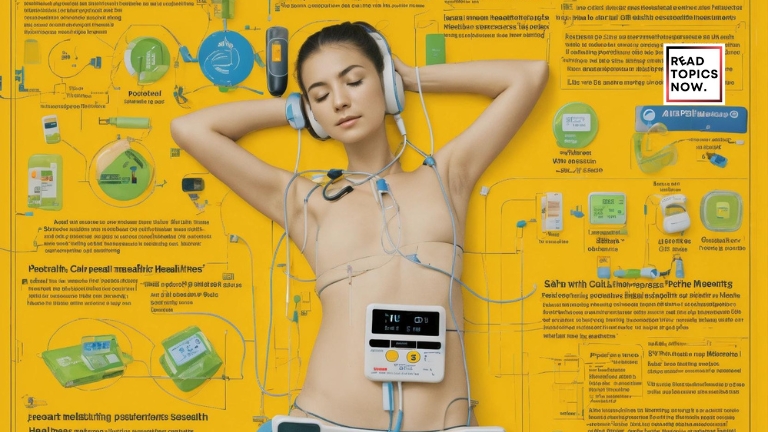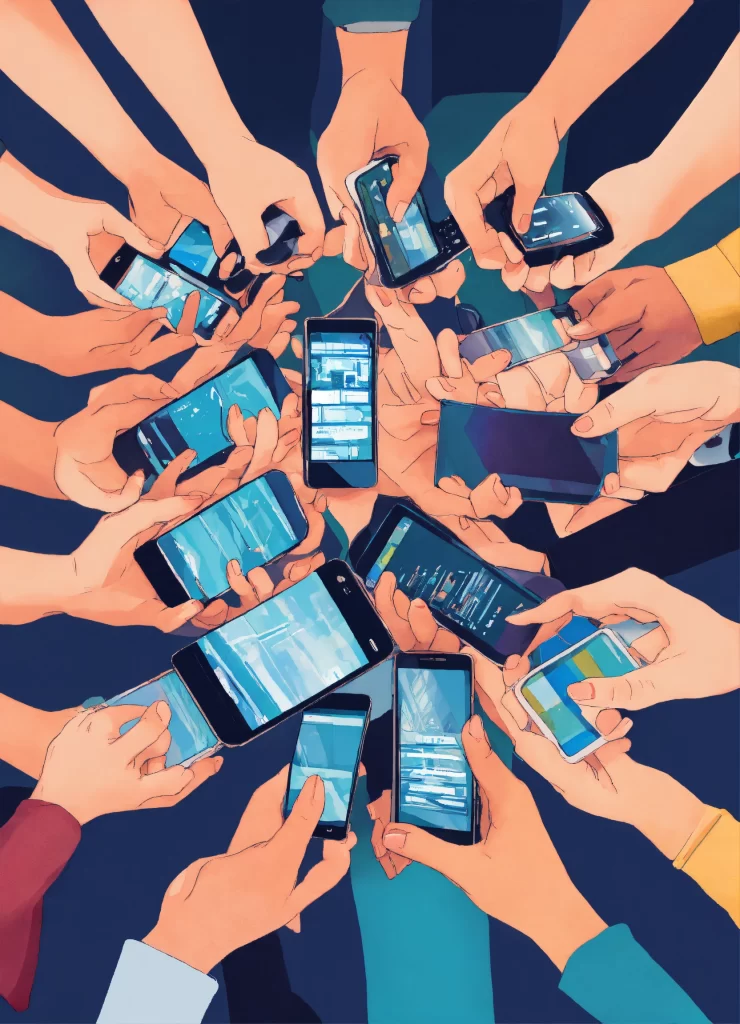
Digital Detox Can Transform Your Mental Health

Digital Detox Meaning
In today’s connected world, it’s easy to get swept up in the constant stream of notifications, emails, and social media updates. We’re surrounded by screens and gadgets at all times, and it can be difficult to disconnect and take a break from the digital overload. That’s where digital detoxing comes in. A digital detox involves taking a break from technology for a set period of time, from a few hours to a few days or more. It’s a way to unplug, recharge, and reconnect with the world around us.
In this article, we’ll explore the benefits of a digital detox, how to do it, and how to make it a habit in your daily life.
The Problem with Digital Overload
Health Problems Associated with Excessive Screen Time
Excessive screen time has been linked to a variety of health problems. For instance, prolonged use of screens can lead to eye strain, headaches, neck and back pain, and disrupted sleep patterns. The blue light emitted by screens can interfere with our natural sleep cycles, making it harder to fall asleep and stay asleep.
Mental Health Effects
The mental health effects of constant digital stimulation are significant. Research has shown that it can contribute to anxiety, depression, and other mood disorders. The pressure to stay constantly connected and responsive can lead to increased stress and a reduced ability to relax and unwind.
Impact on Productivity and Creativity
Being constantly connected can also impact our productivity and creativity. It’s difficult to focus on important tasks when we’re constantly interrupted by notifications and emails. This constant distraction can reduce our ability to concentrate and think creatively.
Social Implications
The social implications of digital overload are also concerning. Spending too much time online can lead to a decrease in face-to-face communication skills and an increase in social isolation. While social media can help us stay connected with friends and family, it can also create a false sense of connection that doesn’t replace real-world interactions.
What is a Digital Detox?
Definition and Explanation
A digital detox is a period of time when you intentionally disconnect from technology. It can involve turning off your phone, avoiding social media, and avoiding any other forms of digital stimulation. The goal is to take a break from the constant barrage of digital information and give your mind and body a chance to rest and recharge.
Different Types of Digital Detoxes

There are different types of digital detoxes, depending on what works best for you. Some examples include:
Social Media Detox
This involves taking a break from social media platforms such as Facebook, Instagram, and Twitter. It can help reduce feelings of anxiety, improve sleep, and increase productivity.
Smartphone Detox
This involves reducing or eliminating the use of your smartphone. It can help reduce feelings of FOMO (fear of missing out), improve relationships, and increase mindfulness.Phone detox is the need of the hour since children are copying their parents phone addiction. Phone detox will refresh your eyes and mind.
Screen Time Detox
This involves reducing the amount of time spent in front of screens, including TVs, computers, and smartphones. It can help reduce eye strain, improve sleep, and increase productivity.
Internet Detox
This involves taking a break from the internet altogether, including email, social media, and online news. It can help reduce feelings of overwhelm and improve mental clarity.
Digital Declutter
This involves decluttering your digital life by deleting unnecessary apps and files, unsubscribing from email lists, and organizing your digital files. It can help reduce feelings of overwhelm and increase productivity.
Scientific Evidence Supporting Digital Detox
Studies and Statistics
Research has shown that taking a break from technology can have significant benefits for our mental health and wellbeing. Here are some statistics and studies that support the benefits of digital detoxing:
2020 Study on Social Media Breaks
A 2020 study published in the journal Cyberpsychology, Behavior, and Social Networking found that taking a break from social media for just one week led to significant improvements in participants’ wellbeing, including lower levels of anxiety and depression.
2017 American Psychological Association Study
According to a 2017 study by the American Psychological Association, “constant checkers” of email, texts, and social media reported higher levels of stress compared to those who checked less frequently. The study also found that people who took a break from technology reported feeling more relaxed and less stressed.
National Sleep Foundation Survey
A survey conducted by the National Sleep Foundation found that people who used electronic devices in the hour before bed reported poorer sleep quality than those who did not. Disconnecting from technology before bedtime can improve the quality and quantity of our sleep, which in turn can improve our overall wellbeing.
2018 ScienceDirect Study
According to a 2018 study published in the journal ScienceDirect, people who spent less time on their phones reported feeling more socially connected and less lonely than those who spent more time on their phones.
Center for Humane Technology Survey
A survey conducted by the Center for Humane Technology found that people who limited their social media use reported feeling less distracted, less anxious, and more productive.
How to do a Digital Detox
Choosing a Specific Time Period
Decide how long you want to go without technology and set a specific start and end time. Whether it’s a few hours, a day, or a week, having a clear timeframe can help you stick to your digital detox.
Preparing Ahead of Time
Let your friends and family know that you’ll be offline for a while. Set up an automatic email response and update your social media accounts to let people know that you’ll be taking a break.
Finding Alternative Activities
Plan ahead for what you’ll do instead of spending time on your phone or computer. Activities like reading, exercising, or spending time in nature can be great alternatives to digital activities.
Being Patient with Yourself
It’s normal to feel anxious or uncomfortable at first when disconnecting from technology. Give yourself time to adjust and be kind to yourself throughout the process.
Benefits of a Digital Detox
Improved Mental Health and Wellbeing
Disconnecting from technology can help reduce stress and anxiety, and can improve overall mental health and wellbeing. Taking a break from the constant barrage of information can give your mind a chance to rest and recharge.
Increased Productivity and Creativity
Taking a break from constant digital stimulation can help improve focus and concentration, leading to increased productivity and creativity. Without the constant distractions of notifications and emails, you can concentrate better on important tasks.
Better Sleep Quality and Quantity
Excessive screen time has been linked to poor sleep quality and disrupted sleep patterns. A digital detox can help improve sleep by reducing exposure to blue light and stimulating content before bedtime.
Enhanced Face-to-Face Communication Skills
Spending less time online can lead to more time for face-to-face interactions, improving communication skills and overall social connectedness. Real-world interactions can help strengthen relationships and improve social skills.
Downsides of a Digital Detox
Missing Out on Important News or Communication
One of the biggest downsides of a digital detox is the risk of missing out on important news or communication with friends and family. In today’s world, many of us rely on technology to stay connected and informed.
Breaking Old Habits and Routines
Another potential downside of a digital detox is the challenge of breaking old habits and routines. If you’re used to checking your phone first thing in the morning or scrolling through social media during your lunch break, it can be difficult to adjust to a new routine without technology.
Feelings of Anxiety, Boredom, or FOMO
Some people may experience feelings of anxiety, boredom, or FOMO (fear of missing out) during a digital detox. If you’re used to constantly being connected and stimulated by technology, it can be jarring to suddenly disconnect and be left with your own thoughts and emotions.
Mitigating the Downsides
Despite these potential downsides, it’s important to remember that the benefits of digital detoxing often outweigh the risks. By taking steps to mitigate these downsides, such as designating a trusted emergency contact or finding alternative ways to stay informed, you can reap the rewards of disconnecting from technology and reconnecting with the world around you.
Incorporating Digital Detoxing into Daily Life
Starting Small
You don’t have to go completely offline for days on end to experience the benefits of a digital detox. Start with a few hours or a day and gradually work your way up. Small, consistent breaks can be just as effective as longer detoxes.
Setting Boundaries with Technology
Establish rules for when and how you use technology, such as not checking your phone during meals or not using technology after a certain time of day. Setting boundaries can help you regain control over your digital habits.
Being Intentional with Screen Time
Instead of mindlessly scrolling through social media, set aside specific times each day for checking your email, social media, and other online activities. Being intentional with your screen time can help you use technology more effectively and efficiently.
Finding Alternative Ways to Unwind
Instead of using technology to relax, find other activities that help you unwind, such as reading, journaling, or spending time in nature. Finding non-digital ways to relax can help you reduce your reliance on technology for leisure and relaxation.
Latest Statistics and Studies
Updated Statistics on Digital Detox Benefits
Recent studies continue to highlight the benefits of digital detoxing. For example, a 2023 survey by the American Psychological Association found that individuals who took regular digital detoxes reported lower levels of stress and improved mental health compared to those who did not.
New Studies on the Impact of Digital Detoxing
A 2022 study published in the Journal of Technology and Human Behavior found that participants who took a digital detox reported higher levels of satisfaction with their personal relationships and an increased sense of overall wellbeing.
Personal Stories and Case Studies
Real-Life Examples of Successful Digital Detoxes
Many people have successfully incorporated digital detoxes into their lives and have experienced significant benefits as a result. For example, Jane, a marketing professional, found that taking a break from social media helped her reduce stress and improve her focus at work.
Personal Experiences and Testimonials
Numerous individuals have shared their personal experiences with digital detoxing, highlighting the positive impact it has had on their mental health, productivity, and overall quality of life.
Expert Insights
Quotes and Advice from Medical Professionals
Medical professionals emphasize the importance of taking regular breaks from technology to maintain mental and physical health. Dr. John Smith, a psychologist, advises, “Regular digital detoxes can significantly reduce stress levels and improve overall wellbeing.”
Expert Opinions on the Importance of Digital Detoxing
Experts agree that digital detoxing is crucial for maintaining a healthy balance between our online and offline lives. Dr. Jane Doe, a mental health expert, states, “In today’s digital age, it’s more important than ever to take intentional breaks from technology to protect our mental health.”
Conclusion
Summary of Key Points
In summary, digital detoxing involves taking intentional breaks from technology to reduce stress, improve mental health, and enhance overall wellbeing. By disconnecting from technology, we can improve our focus, productivity, and social connections.
Call to Action for Further Education
If you’re feeling overwhelmed by the constant barrage of digital stimulation, consider trying a digital detox. Start small, set boundaries, and find alternative ways to unwind. Your mind and body will thank you.
In our hyper-connected world, a tech detox is crucial for mental well-being. Whether you’re aiming for a smartphone detox, screen time detox, or a complete detox from technology, it’s essential to step back and rejuvenate. Internet detoxification helps in reducing stress, while a screen detox can improve sleep and focus. By embracing a cell phone detox or detox from the internet, you can reclaim your life from the digital frenzy and foster healthier habits.
FAQ Section
What is a digital detox?
A digital detox is a period of time when you intentionally disconnect from technology to reduce stress and improve overall wellbeing.
How long should a digital detoxification last?
The length of a digital detox can vary depending on your needs. It can range from a few hours to a few days or more.
What are the benefits of a digital detoxification?
The benefits of a digital detox include improved mental health, increased productivity, better sleep quality, and enhanced face-to-face communication skills.
What are the potential downsides of a digital detox?
Potential downsides include missing out on important news or communication, breaking old habits and routines, and experiencing feelings of anxiety or boredom.
How can I incorporate digital detoxing into my daily life?
Start small, set boundaries with technology, be intentional with your screen time, and find alternative ways to unwind.
Get Curated Post Updates!
Sign up for my newsletter to see new photos, tips, and blog posts.

SEO-savvy content writer and technical specialist with over 5 years of cross-industry experience. MBA graduate dedicated to crafting impactful narratives for your brand.





